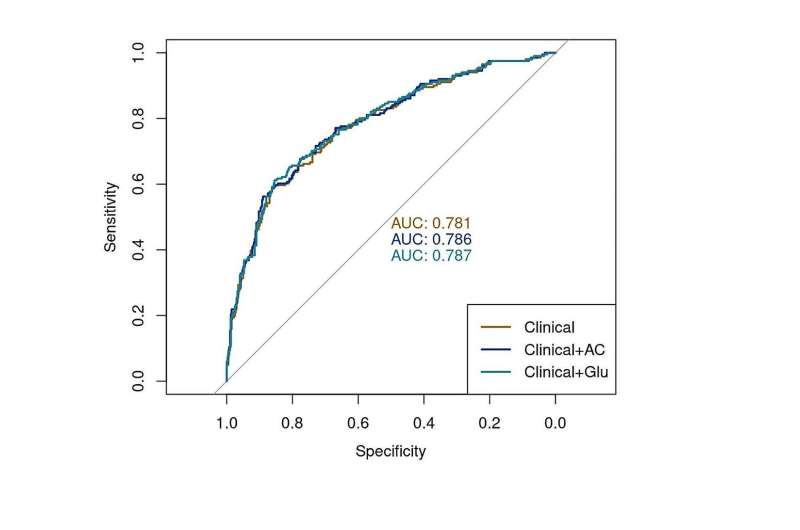This article has been reviewed according to Science X's editorial process and policies. Editors have highlighted the following attributes while ensuring the content's credibility:
fact-checked
proofread
Higher glucose levels worsen prognosis in ischemic stroke patients

Having higher than usual blood sugar levels at the time of hospital admission for an ischemic stroke significantly increases the risk of a poor functional prognosis or death within three months of the stroke. This is the main conclusion of a study by the Endocrinology and Nutrition Services and the Neurology Department of Hospital del Mar, with researchers from the hospital's Research Institute, the RICORS-ICTUS network, and the CIBER of Diabetes and Associated Metabolic Diseases (CIBERDEM).
The study is published in the journal Cardiovascular Diabetology and will continue with further studies to determine the utility of this factor in treating patients with this pathology.
It is known that the inflammatory state in certain diseases can cause increased blood sugar levels, or hyperglycemia, which can influence prognosis. In the case of ischemic stroke, this increase is common, but it has not been analyzed in depth. The Hospital del Mar study delves into this issue, reviewing data from 2,774 patients with this condition.
Besides blood sugar levels at the time of admission and their comparison with each patient's usual levels, other variables were considered, such as age, diabetes, disability, stroke severity, and treatment received.
Considering these variables, higher blood glucose levels compared to usual were confirmed as a factor for worse functional prognosis and mortality three months after the stroke, independently of other factors. An increase of just 13% above usual levels worsens the prognosis, regardless of the glucose level. This was also observed in patients who previously had diabetes, accounting for 35% of the total studied.
Dr. Elisenda Climent, associate doctor of the Endocrinology and Nutrition Service at Hospital del Mar and researcher at its Research Institute, points out, "This variable better reflects the effect of sugar at the time of patient admission, and in the group of patients with higher indices, there is a worse prognosis and mortality."
Specifically, for every 10% increase, the risk of a worse prognosis rises by 7%. In those with higher levels, this risk increases by 62%, and mortality risk by 88%.
Continuing the line of study
Researchers plan to continue studying the effect of sugar in this population to determine if it is beneficial to act on glucose levels. Currently, it is not done due to the risks associated with excessive lowering of glucose levels.
"A more conservative treatment approach is currently chosen, as strict control strategies have not proven superior due to the risks posed by glucose drops for patients' conditions. At present, sugar is not aggressively treated in patients who have had an ischemic stroke.
"Our study may allow for selecting the population that can be worked on more intensively, leveraging new technologies for safer monitoring," explains Dr. Ana Rodríguez, head of the stroke section of the Neurology Service and researcher at the Research Institute of Hospital del Mar.
To do this, new studies will be conducted.
"It is necessary to study whether it is a severity marker, acting on which does not improve the prognosis, or whether it is a factor that can be worked on to improve the condition of patients with higher than usual glucose levels," says Dr. Juan José Chillarón, head of the Endocrinology and Nutrition Service at Hospital del Mar and researcher at its Research Institute.
All this could allow "this subgroup of patients to benefit from more intensive insulin therapy, which could be a potential conceptual change in their approach," notes researcher Joan Jiménez Balado from the Research Institute of Hospital del Mar.
More information: Elisenda Climent et al, Acute-to-chronic glycemic ratio as an outcome predictor in ischemic stroke in patients with and without diabetes mellitus, Cardiovascular Diabetology (2024). DOI: 10.1186/s12933-024-02260-9


















